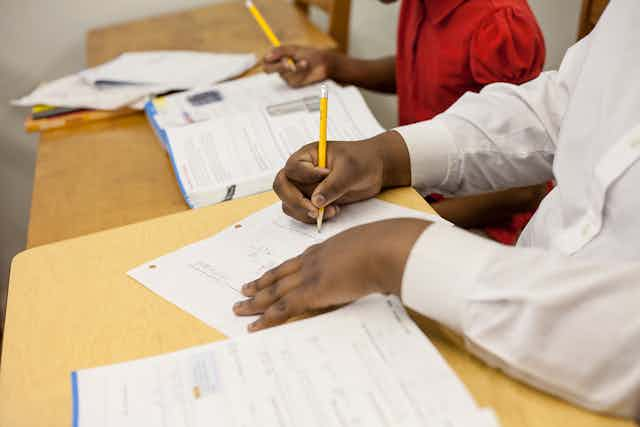President Obama has urged states to cut back on too much testing. In a Facebook video message October 24, the president urged states to devote no more than 2% of classroom time to testing. The pressures of testing, he said, were taking the “joy out of teaching and learning.”
For a long time educators have been emphasizing the negative fallout of testing.
At The Conversation, we have been following the various developments related to the fallout of testing, including mass cheating scandals, the “opt-out movement,” teacher demoralization and evaluations that test teachers on subjects they have never taught.
Testing has always been a contentious issue in American education. Jennifer Keys Adair, assistant professor of early childhood education, University of Texas at Austin, says:
It was policy-makers, who without much input from teachers, researchers or parents, started pushing for testing, starting in the 1980s and leading upto the early 1990s.
But of late, protests related to testing have escalated to a point where students as well as teachers are “opting out” of state-mandated tests. “Opt Out” has quickly turned into a nationwide civil disobedience movement against state-mandated testing in elementary and secondary education.
Mindy L Kornhaber, associate professor of education, Pennsylvania State University, writes,
Last year, Opt Out protests occurred in about half the states. This year, the movement has found support across all 50 states…In New York state alone, the number of students opting out has more than tripled this year.
Pressure on teachers
Several factors have led to this situation. Among them is the kind of pressure that teachers find themselves under.
Steven Ward, professor of sociology at Western Connecticut State University, discusses how teacher job satisfaction has dropped “from 62% of teachers feeling ‘very satisfied’ in 2008 to 39% by 2012.” Teachers, he writes, were finding themselves under tremendous stress.
over half (51%) of teachers report feeling under great stress several days a week, an increase of 70% from teachers reporting stress in 1985.
Mitchell Robinson, chair of the music department at Michigan State University, writes about how music teachers are being evaluated based on subjects they don’t teach, namely math and reading. He says,
Imagine for a moment, a physician being evaluated based upon their patients’ illnesses or injuries, not on the treatment delivered. Or consider the logic behind evaluating a steakhouse based on the fish you had at the seafood restaurant across the street last night.
That was not what the tests were meant to do. Flynn Ross, associate professor of education at University of Southern Maine, explains:
The data from these tests were intended to provide policymakers and educators with evidence to improve educational outcomes for the most disadvantaged students.
However, she argues,
instead of promoting equity and social justice, the data are being used, in some cases, to further punish and disenfranchise the most vulnerable students.
High stakes
Academics point to many other negative consequences of testing as well. Paul Thomas, associate professor of education, Furman University, says,
The focus on raising test scores led to other negative consequences as well – such as a increasing the emphasis on core courses while also eliminating electives such as art and even more teaching for the test. As a result, expectations for students were also narrowed.
Thomas also points to the mass-scale cheating in Atlanta and Washington, DC – another fallout of testing pressures on teachers.
Of all these, the impact on kids has been the most troubling, says University of Texas’s Adair. Testing pressures, she says, changes “the learning experiences of kindergarteners and preschoolers.”
But testing has also been a contentious issue, and some experts disagree. V Scott Solberg associate dean for research, Boston University, says test scores can help teachers improve their teaching.
As a parent, it provides me helpful information as well.
Others point toward countries that are already paying the “steep costs” of “high-stakes” testing. Thomas Owenby, visiting instructor, education and youth studies, Beloit College, who spent five years in Seoul, urges the US to learn from the costs that countries such as South Korea are paying for having a test-oriented education system.
He describes the testing day in the following words:
The entire nation comes to a standstill on the morning of this eight-hour exam. Banks and government offices open an hour later than usual in order to ensure that students will be able to make it to their exam sites on time. Flights are prohibited from taking off or landing during the English listening portion of the exam. In the days leading up to the exam, temples are filled with parents, almost exclusively mothers, making prayers and offerings on behalf of their children.
As Owenby adds,
An over-emphasis on objective outcomes leads to excessive stress and strips away the humanity of young people.

